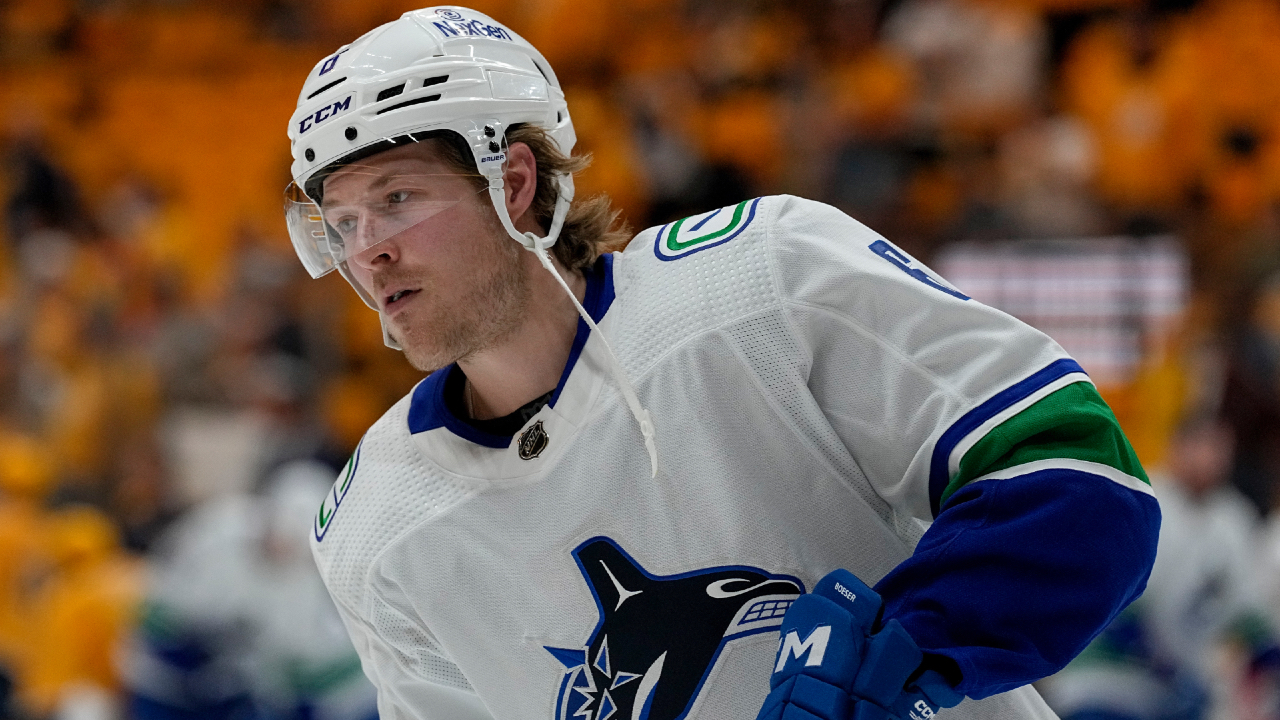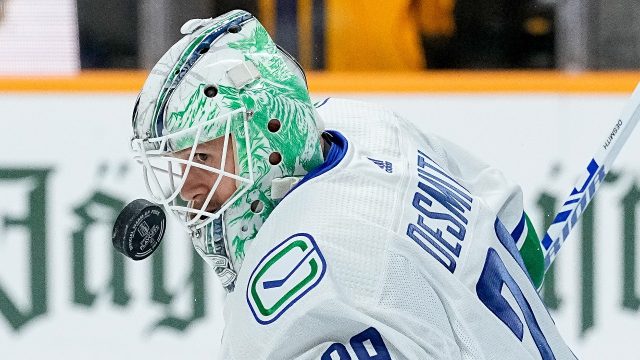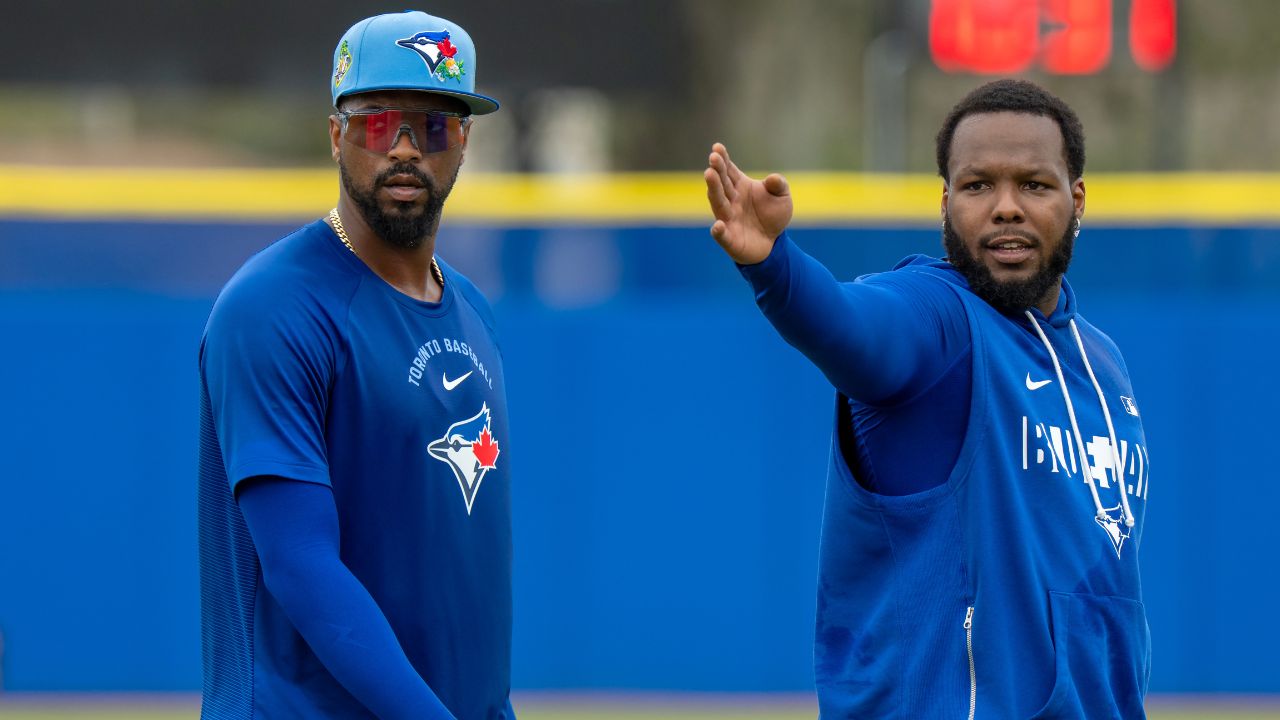
NASHVILLE — To rehearse for his second-biggest moment in Game 3 on Friday night, Brock Boeser stood in front of the goalie the previous day at practice after coach Rick Tocchet changed the Vancouver Canucks’ power play and moved Boeser to the net front.
Teammate J.T. Miller, however, flubbed the script and instead of shooting past Boeser’s screen, skated downhill and zipped a heavy wrist shot into his teammate’s sternum. Signs at the entrance to the arena prohibited firearms, so Miller’s centre-mass missile was not a kill shot, but briefly knocked the wind out of Boeser.
“He’s done that a few times over the years,” Boeser explained after another practice Saturday. “That’s why I usually don’t screen in practice because sometimes I think he’s going to shoot blocker and then he doesn’t and he’ll shoot glove and when I move he hits me. But he said he was sorry. A few years ago, if he would have hit me, he wouldn’t have said sorry.”
Only the Nashville Predators were sorry on Friday when Miller opened scoring on the power play in the Canucks’ 2-1 win with a perfectly-executed, glove-side shot as Boeser bravely stood directly in front of goalie Juuse Saros.
Two Vancouver power plays later, Boeser, made it 2-0 by getting underneath bruising defenceman Jeremy Lauzon at the edge of the crease and redirecting Miller’s laser pass through Saros.
After 40 goals during the regular season and 479 games in the National Hockey League, it was the 27-year-old winger’s first real Stanley Cup Playoffs goal.
It turned out to be the winning goal as the Canucks, trying to win a non-COVID playoff series for the first time since 2011, took a 2-1 lead ahead of Game 4 here Sunday afternoon.
Drafted in 2015 and on the Canucks since the spring of 2017, Boeser is one of nine Vancouver players getting their first experience in genuine playoff hockey.
“I’m still trying to get a grasp of all the emotions,” Boeser said Saturday. “The first couple of games at home, there was a lot of emotions, especially that first game. And even in the second game, momentum shifts and much tigher hockey, harder hockey. I’m just trying to wrap my head around that. Then we come here and for a lot of us guys it’s the first time playing a road playoff game.
“We’re just getting a feel for all of that. We have to look at it (with) a learning mentality and learn as we go, and deal with the emotions as we go.”
What about those 17 games Boeser and the Canucks played during the fan-less pandemic bubble playoffs in Edmonton in the summer of 2020?
“It was so different, way different, you can’t even compare,” Boeser said. “There’s no comparison. Like, in the bubble, I felt like we were just playing hockey. You didn’t feel fans, momentum. It felt like summer hockey almost. It was so weird, I can’t really explain that. It’s definitely not the same.
“You hear about it around the league over time — if guys are playoff players or whatnot. It’s an opportunity for us to make our mark and obviously, individually, you want to make your mark and show that you can be a playoff player and be a guy that your coach can rely on.”
Amid that cyclone of playoff emotion and physicality, Boeser was one of the best Canucks in Game 3 and nobody would have predicted that 15 months ago when Tocchet became head coach.
Determined to put two disappointing and difficult seasons behind him after dealing with the death of his dad, Duke Boeser, and the anguish and anger within the grief that followed, Boeser has transformed his game while healing emotionally.
He has always been a dangerous offensive player, scoring 29 goals in his rookie season to finish runnerup for the Calder Trophy in 2018. But Boeser’s game was considered fairly one-dimensional. He was not someone who flourished in heavy traffic or defensive situations.
On Friday, however, Boeser played half of the last seven minutes and was on the ice for the final 62 seconds as the Predators pressed frantically for a tying goal.
“I really liked his game yesterday,” Tocchet said. “I think he’s gradually kind of seeing what playoff hockey is all about. I thought yesterday he was one of our better players positionally, obviously getting that goal in that (tough) area, screening the goalie for Millsy. He was an impact player for us.”
Asked about Boeser’s mid-career evolution, Tocchet said: “Well, I think mentally, he’s at a really good place. When I first got here, I didn’t know Brock too well, and I knew some of the stuff in his life that he went through, and I felt that you have to build a relationship with him. I think he believed in what we’re doing here and I think he bought in. It started this summer. He changed his workouts. He didn’t do that (summer league in Minnesota) where it’s river hockey. He didn’t want to do that (and) that to me, right away I go, ‘This guy’s serious.’”
Boeser hasn’t registered a hit yet in the series, but neither is he shying away from contact. Filip Forsberg flattened him with a reverse-hit on Friday as Boeser was closing on the Nashville star.
“I knew he was going to reverse me the whole time and I still let it happen,” Boeser smiled. “But after the fact, I thought: you know what, it’s good for me to take a hit and get into the game.”
Boeser even briefly tussled behind the play with former teammate Luke Schenn in Game 2 Tuesday in Vancouver.
“He kept grabbing me, so I grabbed him back,” Boeser explained. “He was asking if I wanted one. I don’t think I said anything back.”
What Boeser wants after several desolate seasons in Vancouver is to win, and to help the Canucks do so by proving he can handle Stanley Cup hockey and that the transformation he displayed during the regular season can survive the playoffs.
“I personally think, like, you know, we had a great regular season for our team and a lot of guys individually,” he explained. “But we’ve got to prove ourselves in the playoffs. You don’t want to be the guy that goes into the playoffs and doesn’t do anything or has a really good regular season, but when playoffs come around, you’re not there. But again, it comes back to for some of us, it’s our first time and (there is) a lot of emotions and pressure. It’s just learning about all that and really just trying to produce and be the best we can be.”
TOCCHET ROCKET
Tocchet was even less impressed by the $2,000 fine the NHL assessed Saturday to Michael McCarron for the Predator’s hit in Game 3 on Canuck goalie Casey DeSmith. McCarron deliberately ran over DeSmith, who is filling in for injured starter Thatcher Demko, behind the Canucks’ net at 12:28 of the opening period.
“It’s a little sensitive,” Tocchet told reporters. “You know, we’ve already got a goalie hurt. Listen, sometimes there’s collisions. I get it. I thought he, instead of going straight, he did that one thing (leaning into DeSmith) at the end. That separates, ‘well, it’s accidental’ to it wasn’t accidental. He put his shoulder into Casey.”
And the fine?
“I’m sure the refs’ antennas are up if something even remotely close to that happens (again),” Tocchet said. “But the two grand? I don’t think it means much, no.”
The real consequence is that McCarron’s interference penalty led to Miller’s power-play goal.







